Home » Meta-analysis
Abstract
Rev Bras Ter Intensiva. 2019;31(4):548-554
DOI 10.5935/0103-507X.20190077
The evidence of improved survival with the use of extracorporeal membrane oxygenation (ECMO) in acute respiratory distress syndrome is still uncertain.
This systematic review and meta-analysis was registered in the PROSPERO database with the number CRD-42018098618. We performed a structured search of Medline, Lilacs, and ScienceDirect for randomized controlled trials evaluating the use of ECMO associated with (ultra)protective mechanical ventilation for severe acute respiratory failure in adult patients. We used the Cochrane risk of bias tool to evaluate the quality of the evidence. Our primary objective was to evaluate the effect of ECMO on the last reported mortality. Secondary outcomes were treatment failure, hospital length of stay and the need for renal replacement therapy in both groups.
Two randomized controlled studies were included in the meta-analysis, comprising 429 patients, of whom 214 were supported with ECMO. The most common reason for acute respiratory failure was pneumonia (60% - 65%). Respiratory ECMO support was associated with a reduction in last reported mortality and treatment failure with risk ratios (RR: 0.76; 95%CI 0.61 - 0.95 and RR: 0.68; 95%CI 0.55 - 0.85, respectively). Extracorporeal membrane oxygenation reduced the need for renal replacement therapy, with a RR of 0.88 (95%CI 0.77 - 0.99). Intensive care unit and hospital lengths of stay were longer in ECMO-supported patients, with an additional P50th 14.84 (P25th - P75th: 12.49 - 17.18) and P50th 29.80 (P25th - P75th: 26.04 - 33.56] days, respectively.
Respiratory ECMO support in severe acute respiratory distress syndrome patients is associated with a reduced mortality rate and a reduced need for renal replacement therapy but a substantial increase in the lengths of stay in the intensive care unit and hospital. Our results may help bedside decision-making regarding ECMO initiation in patients with severe respiratory distress syndrome.


Abstract
Rev Bras Ter Intensiva. 2019;31(4):548-554
DOI 10.5935/0103-507X.20190077
The evidence of improved survival with the use of extracorporeal membrane oxygenation (ECMO) in acute respiratory distress syndrome is still uncertain.
This systematic review and meta-analysis was registered in the PROSPERO database with the number CRD-42018098618. We performed a structured search of Medline, Lilacs, and ScienceDirect for randomized controlled trials evaluating the use of ECMO associated with (ultra)protective mechanical ventilation for severe acute respiratory failure in adult patients. We used the Cochrane risk of bias tool to evaluate the quality of the evidence. Our primary objective was to evaluate the effect of ECMO on the last reported mortality. Secondary outcomes were treatment failure, hospital length of stay and the need for renal replacement therapy in both groups.
Two randomized controlled studies were included in the meta-analysis, comprising 429 patients, of whom 214 were supported with ECMO. The most common reason for acute respiratory failure was pneumonia (60% - 65%). Respiratory ECMO support was associated with a reduction in last reported mortality and treatment failure with risk ratios (RR: 0.76; 95%CI 0.61 - 0.95 and RR: 0.68; 95%CI 0.55 - 0.85, respectively). Extracorporeal membrane oxygenation reduced the need for renal replacement therapy, with a RR of 0.88 (95%CI 0.77 - 0.99). Intensive care unit and hospital lengths of stay were longer in ECMO-supported patients, with an additional P50th 14.84 (P25th - P75th: 12.49 - 17.18) and P50th 29.80 (P25th - P75th: 26.04 - 33.56] days, respectively.
Respiratory ECMO support in severe acute respiratory distress syndrome patients is associated with a reduced mortality rate and a reduced need for renal replacement therapy but a substantial increase in the lengths of stay in the intensive care unit and hospital. Our results may help bedside decision-making regarding ECMO initiation in patients with severe respiratory distress syndrome.


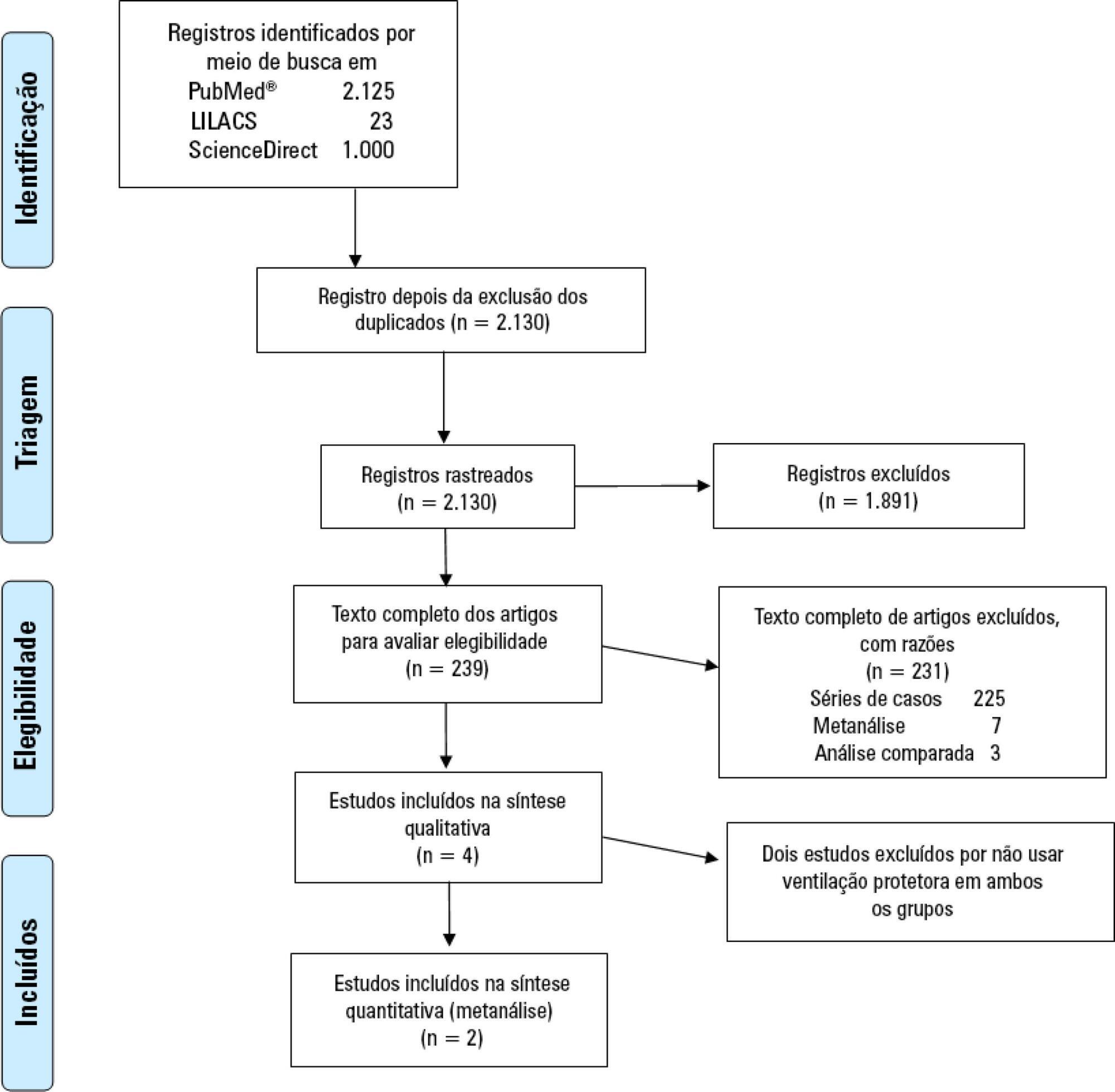
Abstract
Rev Bras Ter Intensiva. 2018;30(3):376-384
DOI 10.5935/0103-507X.20180054
To evaluate whether early initiation of renal replacement therapy is associated with lower mortality in patients with acute kidney injury compared to delayed initiation.
We performed a systematic review and meta-analysis of randomized controlled trials comparing early versus delayed initiation of renal replacement therapy in patients with acute kidney injury without the life-threatening acute kidney injury-related symptoms of fluid overload or metabolic disorders. Two investigators extracted the data from the selected studies. The Cochrane Risk of Bias Tool was used to assess the quality of the studies, and the Grading of Recommendations Assessment, Development and Evaluation (GRADE) approach was used to test the overall quality of the evidence.
Six randomized controlled trials (1,292 patients) were included. There was no statistically significant difference between early and delayed initiation of renal replacement therapy regarding the primary outcome (OR 0.82; 95%CI, 0.48 - 1.42; p = 0.488), but there was an increased risk of catheter-related bloodstream infection when renal replacement therapy was initiated early (OR 1.77; 95%CI, 1.01 - 3.11; p = 0.047). The quality of evidence generated by our meta-analysis for the primary outcome was considered low due to the risk of bias of the included studies and the heterogeneity among them.
Early initiation of renal replacement therapy is not associated with improved survival. However, the quality of the current evidence is low, and the criteria used for -early- and -delayed- initiation of renal replacement therapy are too heterogeneous among studies.


Abstract
Rev Bras Ter Intensiva. 2018;30(3):376-384
DOI 10.5935/0103-507X.20180054
To evaluate whether early initiation of renal replacement therapy is associated with lower mortality in patients with acute kidney injury compared to delayed initiation.
We performed a systematic review and meta-analysis of randomized controlled trials comparing early versus delayed initiation of renal replacement therapy in patients with acute kidney injury without the life-threatening acute kidney injury-related symptoms of fluid overload or metabolic disorders. Two investigators extracted the data from the selected studies. The Cochrane Risk of Bias Tool was used to assess the quality of the studies, and the Grading of Recommendations Assessment, Development and Evaluation (GRADE) approach was used to test the overall quality of the evidence.
Six randomized controlled trials (1,292 patients) were included. There was no statistically significant difference between early and delayed initiation of renal replacement therapy regarding the primary outcome (OR 0.82; 95%CI, 0.48 - 1.42; p = 0.488), but there was an increased risk of catheter-related bloodstream infection when renal replacement therapy was initiated early (OR 1.77; 95%CI, 1.01 - 3.11; p = 0.047). The quality of evidence generated by our meta-analysis for the primary outcome was considered low due to the risk of bias of the included studies and the heterogeneity among them.
Early initiation of renal replacement therapy is not associated with improved survival. However, the quality of the current evidence is low, and the criteria used for -early- and -delayed- initiation of renal replacement therapy are too heterogeneous among studies.


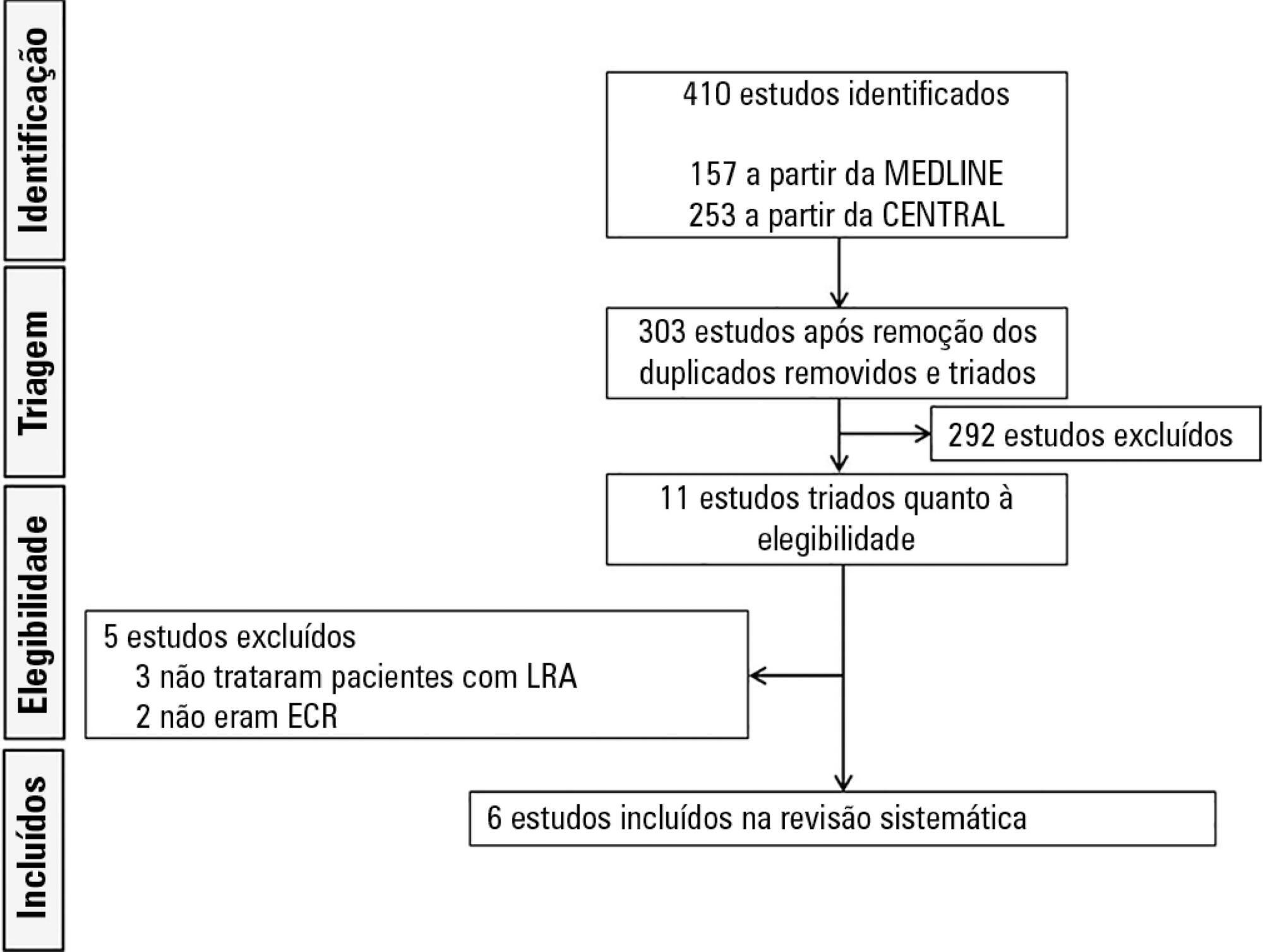
Abstract
Rev Bras Ter Intensiva. 2016;28(3):256-260
DOI 10.5935/0103-507X.20160050
Different research designs have various advantages and limitations inherent to their main characteristics. Knowledge of the proper use of each design is of great importance to understanding the applicability of research findings to clinical epidemiology.
In intensive care, a hierarchical classification of designs can often be misleading if the characteristics of the design in this context are not understood. One must therefore be alert to common problems in randomized clinical trials and systematic reviews/meta-analyses that address clinical issues related to the care of the critically ill patient.


Abstract
Rev Bras Ter Intensiva. 2016;28(3):256-260
DOI 10.5935/0103-507X.20160050
Different research designs have various advantages and limitations inherent to their main characteristics. Knowledge of the proper use of each design is of great importance to understanding the applicability of research findings to clinical epidemiology.
In intensive care, a hierarchical classification of designs can often be misleading if the characteristics of the design in this context are not understood. One must therefore be alert to common problems in randomized clinical trials and systematic reviews/meta-analyses that address clinical issues related to the care of the critically ill patient.


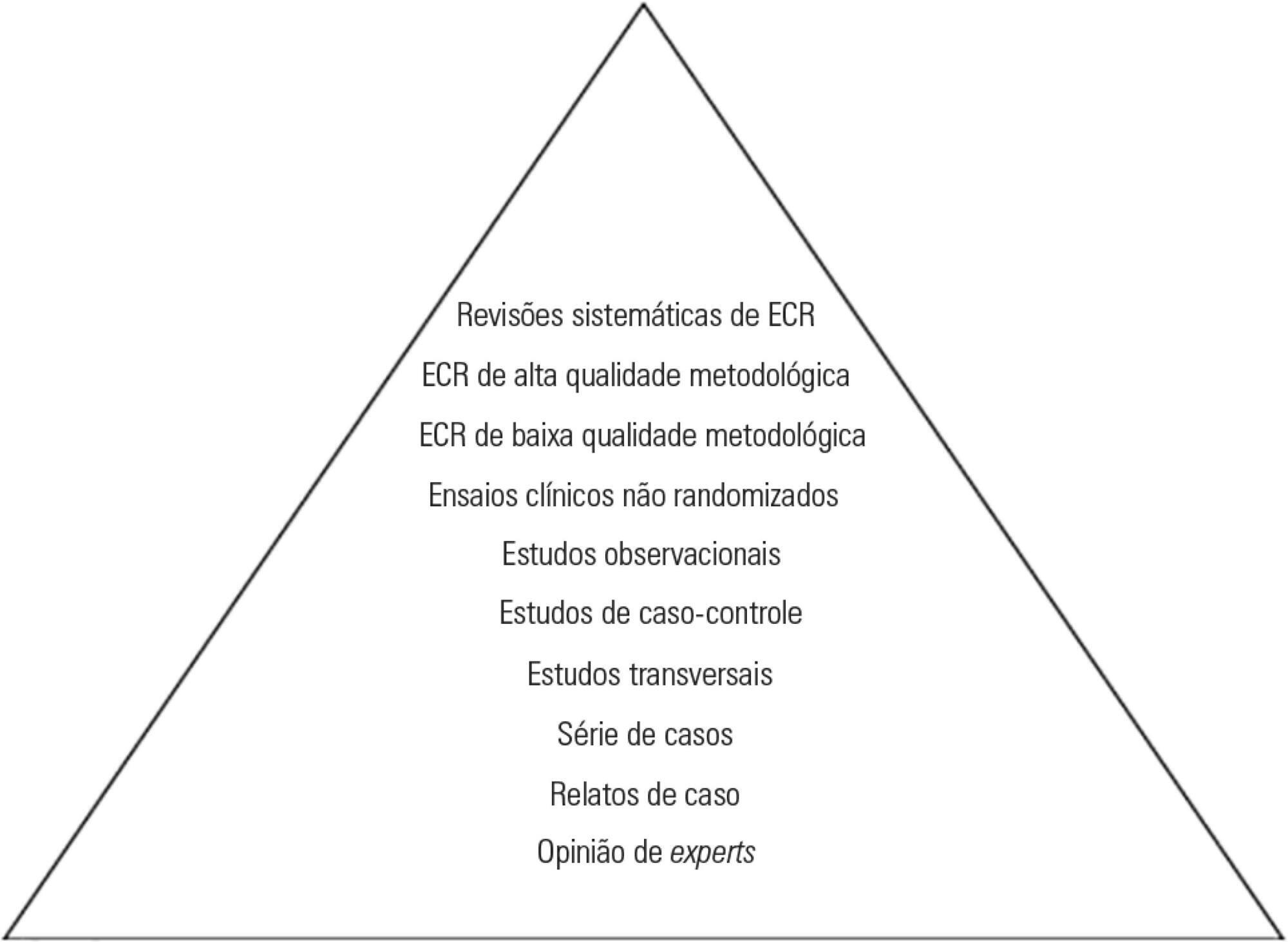
Abstract
Rev Bras Ter Intensiva. 2010;22(4):384-394
DOI 10.1590/S0103-507X2010000400012
The use of corticosteroids in acute lung injury and acute respiratory distress syndrome is one of the most controversial issues in the literature. However, acute lung injury/acute respiratory distress syndrome studies are restricted to adults, despite the widespread use of corticosteroid for hyper-reactive respiratory airway diseases in children. This review aimed to describe experimental and clinical evidence for corticosteroid therapy in acute lung injury/acute respiratory distress syndrome and to point out the risks and benefits of its use in pediatrics. For this purpose, an extensive review of the literature was performed from 1980 to 2010 including both experimental and clinical papers, as well as reviews and meta-analysis, using Medline, Cochrane Central Register of Controlled Trials, Cochrane database of systematic reviews, SciELO, Lilacs and Bireme databases. The search terms were: acute lung injury, acute respiratory distress syndrome, steroids, child, clinical trials, meta-analyses, reviews, and case reports. Most studies showed that the corticosteroids-induced down-regulation of systemic inflammatory response is associated with oxygenation improvement, reduction of multiple organ dysfunctions, mechanical ventilation time, and intensive care units length of stay. Based on the literature, the authors suggest early and prolonged methylprednisolone administration for acute lung injury/acute respiratory distress syndrome, using continuous 1 mg/kg/day infusion to prevent glycemic variability, associated with strict infection surveillance. In addition, they recommend some diagnostic parameters, interventions and choices of endpoint variables to be adjusted to improve pediatric trials feasibility. Therefore, more research is required to establish the safety and efficacy of methylprednisolone in pediatric patients with acute lung injury/acute respiratory distress syndrome , as well as to determine the best parameters for monitoring steroid side effects and outcomes.


Abstract
Rev Bras Ter Intensiva. 2010;22(4):384-394
DOI 10.1590/S0103-507X2010000400012
The use of corticosteroids in acute lung injury and acute respiratory distress syndrome is one of the most controversial issues in the literature. However, acute lung injury/acute respiratory distress syndrome studies are restricted to adults, despite the widespread use of corticosteroid for hyper-reactive respiratory airway diseases in children. This review aimed to describe experimental and clinical evidence for corticosteroid therapy in acute lung injury/acute respiratory distress syndrome and to point out the risks and benefits of its use in pediatrics. For this purpose, an extensive review of the literature was performed from 1980 to 2010 including both experimental and clinical papers, as well as reviews and meta-analysis, using Medline, Cochrane Central Register of Controlled Trials, Cochrane database of systematic reviews, SciELO, Lilacs and Bireme databases. The search terms were: acute lung injury, acute respiratory distress syndrome, steroids, child, clinical trials, meta-analyses, reviews, and case reports. Most studies showed that the corticosteroids-induced down-regulation of systemic inflammatory response is associated with oxygenation improvement, reduction of multiple organ dysfunctions, mechanical ventilation time, and intensive care units length of stay. Based on the literature, the authors suggest early and prolonged methylprednisolone administration for acute lung injury/acute respiratory distress syndrome, using continuous 1 mg/kg/day infusion to prevent glycemic variability, associated with strict infection surveillance. In addition, they recommend some diagnostic parameters, interventions and choices of endpoint variables to be adjusted to improve pediatric trials feasibility. Therefore, more research is required to establish the safety and efficacy of methylprednisolone in pediatric patients with acute lung injury/acute respiratory distress syndrome , as well as to determine the best parameters for monitoring steroid side effects and outcomes.


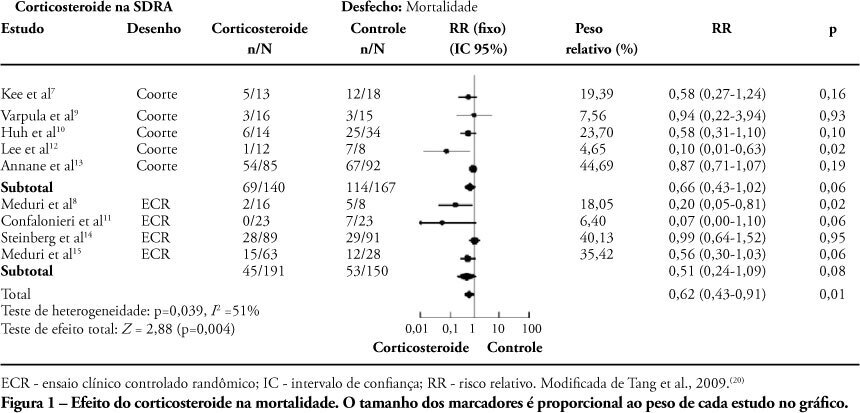
Abstract
Rev Bras Ter Intensiva. 2006;18(4):366-373
DOI 10.1590/S0103-507X2006000400008
BACKGROUND AND OBJECTIVES: Preoperative glucocorticoid administration has been proposed for reducing postoperative morbidity. This is not widely used before esophageal resection because of incomplete knowledge regarding its effectiveness. The aim here was to assess the effects of preoperative glucocorticoid administration in adults undergoing esophageal resection for esophageal carcinoma. METHODS: Studies were identified by searching the Cochrane Controlled Trials Register, MEDLINE, EMBASE, CancerLit, SCIELO and Cochrane Library, and by manual searching from relevant articles. The last search for clinical trials for this systematic review was performed in December 2005. This review included randomized studies of patients with potentially resectable carcinomas of the esophagus that compared preoperative glucocorticoid administration with placebo. Data were extracted by the reviewer, and the trial quality was assessed using Jadad scoring. Odds ratio with 95% confidence limits and bayesian relative risk were used to assess the significance of the difference between the treatment arms. RESULTS: Four randomized trials involving 169 patients were found. There were no differences in postoperative mortality, anastomotic leakage, hepatic and renal failure between the glucocorticoid and placebo groups. There were fewer postoperative respiratory complications (95% CI = 0.09-0.46), sepsis (95% CI = 0.10-0.81), and total postoperative complications (95% CI = 0.06-0.23) with preoperative glucocorticoid administration. CONCLUSIONS: Prophylactic administration of glucocorticoids is associated with decreased postoperative complications.


Abstract
Rev Bras Ter Intensiva. 2006;18(4):366-373
DOI 10.1590/S0103-507X2006000400008
BACKGROUND AND OBJECTIVES: Preoperative glucocorticoid administration has been proposed for reducing postoperative morbidity. This is not widely used before esophageal resection because of incomplete knowledge regarding its effectiveness. The aim here was to assess the effects of preoperative glucocorticoid administration in adults undergoing esophageal resection for esophageal carcinoma. METHODS: Studies were identified by searching the Cochrane Controlled Trials Register, MEDLINE, EMBASE, CancerLit, SCIELO and Cochrane Library, and by manual searching from relevant articles. The last search for clinical trials for this systematic review was performed in December 2005. This review included randomized studies of patients with potentially resectable carcinomas of the esophagus that compared preoperative glucocorticoid administration with placebo. Data were extracted by the reviewer, and the trial quality was assessed using Jadad scoring. Odds ratio with 95% confidence limits and bayesian relative risk were used to assess the significance of the difference between the treatment arms. RESULTS: Four randomized trials involving 169 patients were found. There were no differences in postoperative mortality, anastomotic leakage, hepatic and renal failure between the glucocorticoid and placebo groups. There were fewer postoperative respiratory complications (95% CI = 0.09-0.46), sepsis (95% CI = 0.10-0.81), and total postoperative complications (95% CI = 0.06-0.23) with preoperative glucocorticoid administration. CONCLUSIONS: Prophylactic administration of glucocorticoids is associated with decreased postoperative complications.



Abstract
Rev Bras Ter Intensiva. 2007;19(4):475-480
DOI 10.1590/S0103-507X2007000400012
BACKGROUND AND OBJECTIVES: Systematic reviews are important knowledge generating tools to help the decision making process in the Critical Care Unit. This narrative aims to describe the important elements used to critically appraise intensive care-related systematic reviews. CONTENTS: When critically assessing systematic reviews, one should pay particular attention to the importance and appropriateness of the research question, the search strategy, the inclusion criteria and methodological quality of the studies included, and the methods of data extraction. In addition, a relevant systematic review must have consistent data (in case of a meta-analysis) or the cause of the heterogeneity must have been adequately explored, and results must be applicable in critical patients. CONCLUSIONS: To apply correctly the available scientific evidence, one should critically assess data quality of systematic reviews, selecting the relevant information to manage the critically ill patient.


Abstract
Rev Bras Ter Intensiva. 2007;19(4):475-480
DOI 10.1590/S0103-507X2007000400012
BACKGROUND AND OBJECTIVES: Systematic reviews are important knowledge generating tools to help the decision making process in the Critical Care Unit. This narrative aims to describe the important elements used to critically appraise intensive care-related systematic reviews. CONTENTS: When critically assessing systematic reviews, one should pay particular attention to the importance and appropriateness of the research question, the search strategy, the inclusion criteria and methodological quality of the studies included, and the methods of data extraction. In addition, a relevant systematic review must have consistent data (in case of a meta-analysis) or the cause of the heterogeneity must have been adequately explored, and results must be applicable in critical patients. CONCLUSIONS: To apply correctly the available scientific evidence, one should critically assess data quality of systematic reviews, selecting the relevant information to manage the critically ill patient.


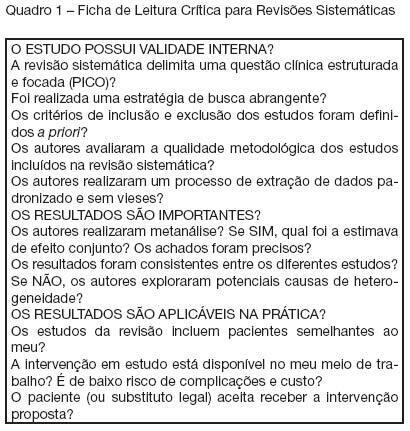
Search
Search in:
Case reports (56) Child (53) Coronavirus infections (34) COVID-19 (46) Critical care (116) Critical illness (54) Extracorporeal membrane oxygenation (26) Infant, newborn (27) Intensive care (72) Intensive care units (256) Intensive care units, pediatric (31) mechanical ventilation (38) Mortality (76) Physical therapy modalities (28) Prognosis (61) Respiration, artificial (119) Respiratory insufficiency (26) risk factors (34) SARS-CoV-2 (28) Sepsis (98)


